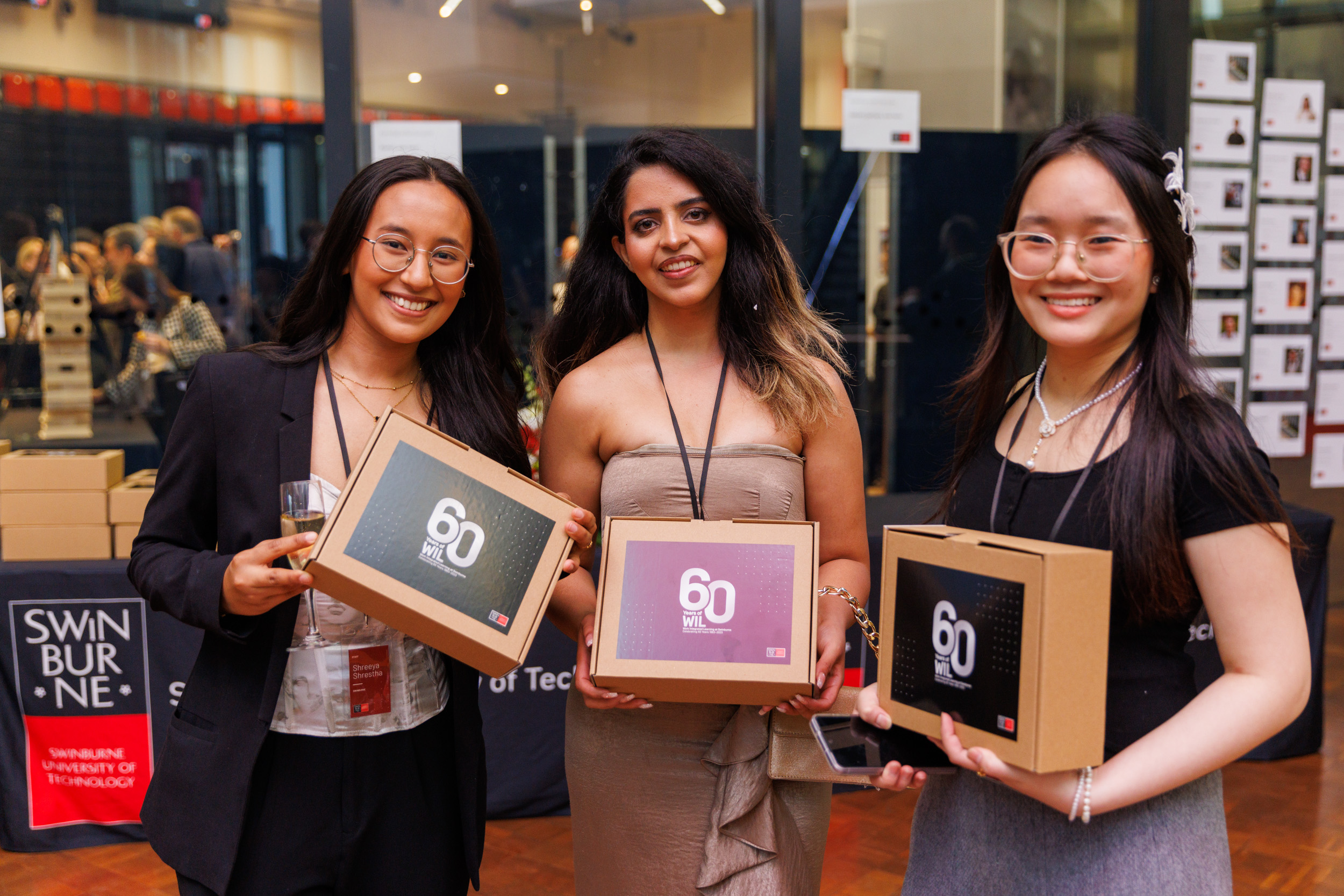Swinburne celebrates 60 years of Work Integrated Learning

Swinburne’s students, staff and partners gathered together to celebrate 60 years of Work Integrated Learning.
In summary
- Swinburne is celebrating 60 years of Work Integrated Learning
- 100 per cent of undergraduate students at Swinburne engage in at least one instance of Work Integrated Learning during their degrees
- Our commitment to Work Integrated Learning is underpinned by our strong and long-standing industry partnerships
Swinburne University of Technology is marking a milestone in our commitment to Work Integrated Learning, by celebrating 60 years of ensuring Swinburne learners receive a work experience as part of their studies.
“Swinburne’s commitment to Work Integrated Learning dates back to the 1960s, when we were first recognised as a sector leader in this space, offering Industry-Based Learning courses. Back then, students worked during the day and went to classes at night. This milestone is a chance to reflect on our rich history and build on it for the future,” says Swinburne’s Director of Employability, Professor Ruth Bridgstock.
Swinburne’s strategic plan, Horizon 2025, further enhanced the commitment to Work Integrated Learning. After three years of intensive work, the university has now achieved one of the ambitious moon shots from this plan: that every Swinburne learner gets at least one work experience.
Additionally, more than nine in ten undergraduate courses now contain a full progression of work experience at every level of the degree.
Creating a sustainable Work Integrated Learning ecosystem at scale
The Swinburne Work Integrated Learning Transformation program was launched to bring staff, students, alumni and industry partners together to create a lasting and sustainable Work Integrated Learning ecosystem at scale.
This program has seen the systematic embedding of Work Integrated Learning into all Swinburne courses and 890 units in total.
“We’re delighted to say that 100 per cent of our undergraduate vocational and higher education students engage in at least one instance of Work Integrated Learning during their degrees. This encompasses a range of industry-partnered learning opportunities, including placements, internships, and industry projects,” Professor Bridgstock adds.
The program has demonstrated the strong benefits of Work Integrated Learning to students’ employability and career outcomes.
“Student satisfaction levels are significantly higher in units where Work Integrated Learning is mandatory, and our studies show that students who have participated in Work Integrated Learning demonstrate higher career readiness,” says Professor Bridgstock.
The impact on students’ career behaviour is also notable, with students who participated in Work Integrated Learning more likely to engage in career development activities such as professional networking.
“Work Integrated Learning makes a demonstrable positive difference to graduate employment outcomes,” says Professor Bridgstock.

Director of Swinburne’s Employability team Professor Ruth Bridgstock says that Swinburne had invested wisely to make a difference to our students’ lives and careers.
Forging meaningful industry partnerships
Swinburne’s commitment to Work Integrated Learning is underpinned by our strong, long-standing industry partnerships.
A diverse range of more than 400 organisations, from start-ups to multinational companies have partnered with more than 2000 Swinburne students through our flagship Professional Placements program. The program offers students a six or 12 month paid opportunity to work in industry during their degree program.
“Working with Swinburne has been a game changer in terms of our talent pipeline. It’s also a great way to give back – we all started somewhere and getting that first rung on the ladder is incredibly hard. For us to be able to give people that first opportunity is incredibly valuable,” says Derek Dyson, General Manager at WTFN Entertainment.
Hosting Swinburne students also gives organisations’ current employees opportunities to develop their leadership skills.
“The Professional Placement program has afforded existing staff the opportunity to develop themselves through interaction and engagement with Swinburne students,” says Peter Moran, Coordinator of Construction Development at City of Yarra.
Looking ahead
In 2024, Swinburne will be exploring new models that emphasise student innovation, enterprise capabilities and digital technology skills.
Swinburne will further hone and refine its processes and supports for employers and students. The university will also continue to provide a tailored program of work experiences especially for international and equity group students, some of whom face barriers to engagement with Work Integrated Learning.
“Our ultimate goal is personalised and relevant employability development and Work Integrated Learning for every student, and a mature pipeline of talent for industry, assuring great outcomes for all,” says Professor Bridgstock.
-
Media Enquiries
Related articles
-

- University
- Student News
Swinburne secures New Colombo Plan funding, expanding global opportunities for students
Swinburne has secured $943,000 in New Colombo Plan funding, expanding student opportunities for study, work and internships across the Indo-Pacific
Friday 06 February 2026 -
%20and%20Dr%20Heather%20Handley%20(Museums%20Victoria).%20Photographer%20-%20Tim%20Carrafa.%20Source%20-%20Museums%20Victoria%20(7).jpg/_jcr_content/renditions/cq5dam.web.256.144.jpeg)
- University
Museums Victoria and Swinburne University of Technology announce learning partnership
Museums Victoria and Swinburne University of Technology are proud to announce a new three-year partnership.
Wednesday 11 February 2026 -

- Technology
- University
World-first partnership with Adobe drives tech-fluency at Swinburne
Swinburne has become the first Adobe Creative Campus in the world to provide all staff and learners with Adobe Creative Cloud, including Adobe’s full offering of generative AI tools
Tuesday 27 January 2026 -

- Design
- Technology
- Health
- Law
- Education
- Business
- Science
- University
- Engineering
Swinburne moves up in Times Higher Education World University Rankings by Subject 2026
Swinburne University of Technology has performed strongly in the Times Higher Education World University Rankings by Subject 2026, with two subjects moving up the ranks.
Thursday 22 January 2026 -

- University
- Engineering
Mechanical engineering alumni celebrate fifty years since graduation
Swinburne’s mechanical engineering graduates from 1975 celebrate a fifty-year anniversary, reminiscing on their time at Swinburne and their careers.
Tuesday 13 January 2026

